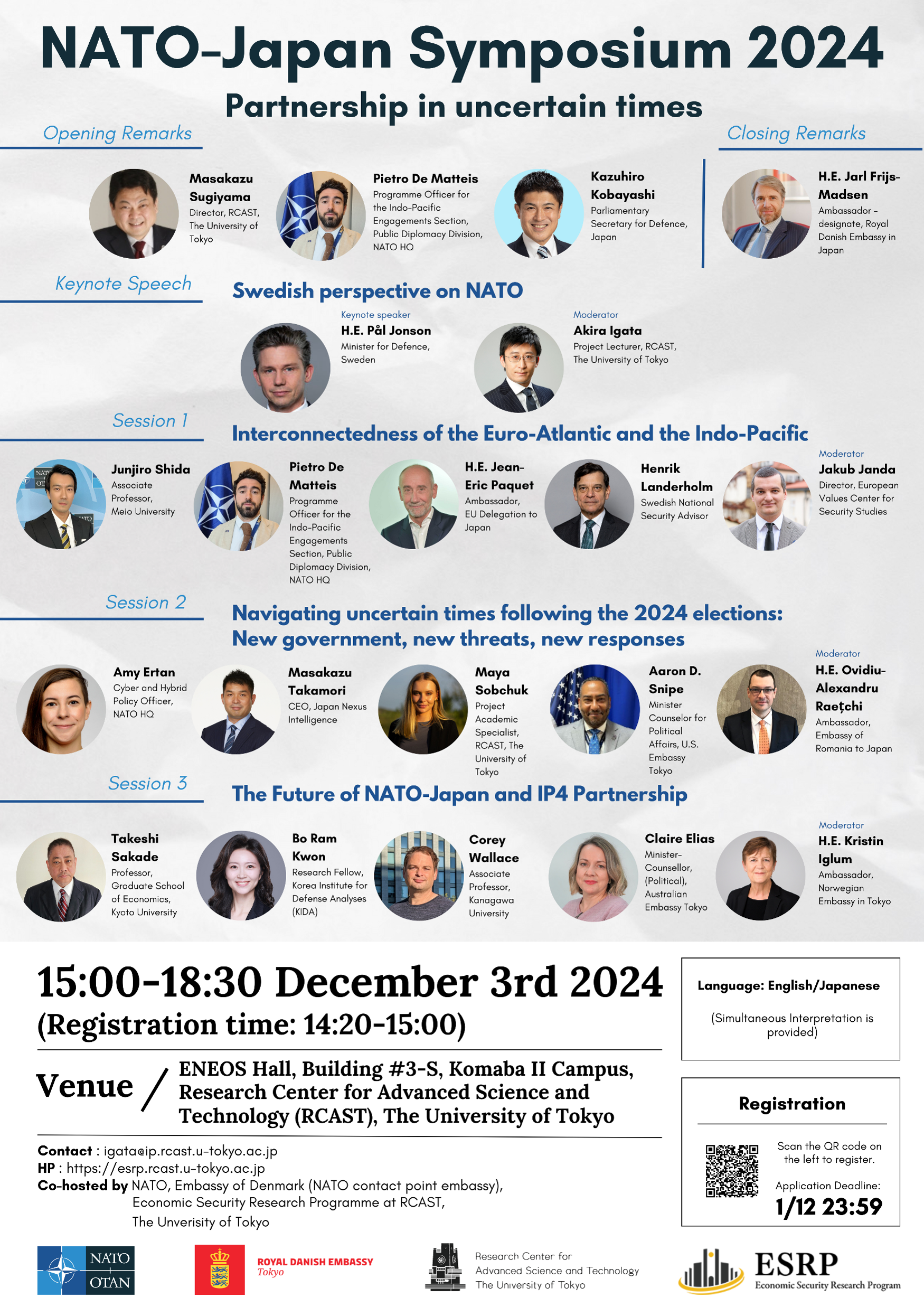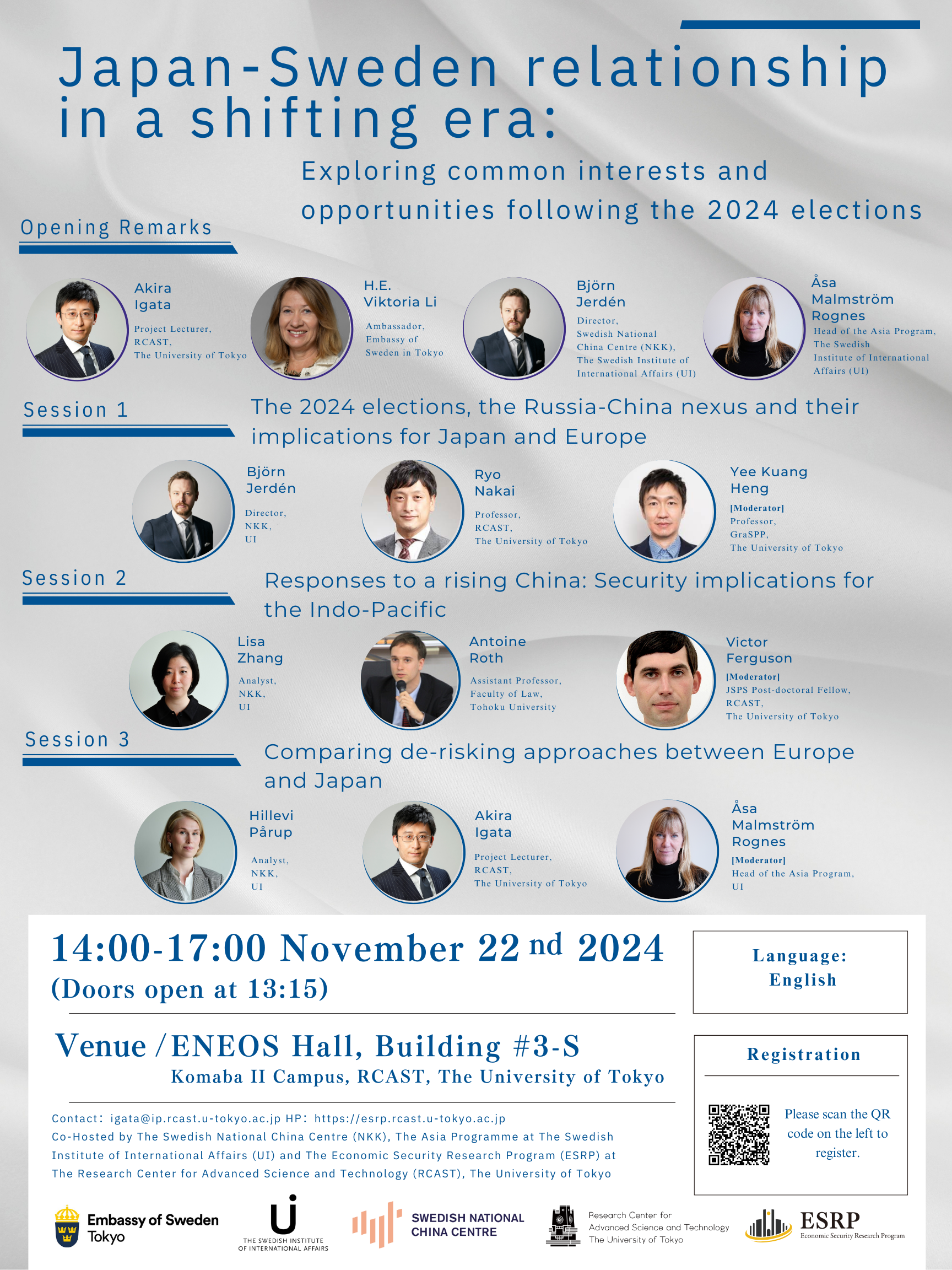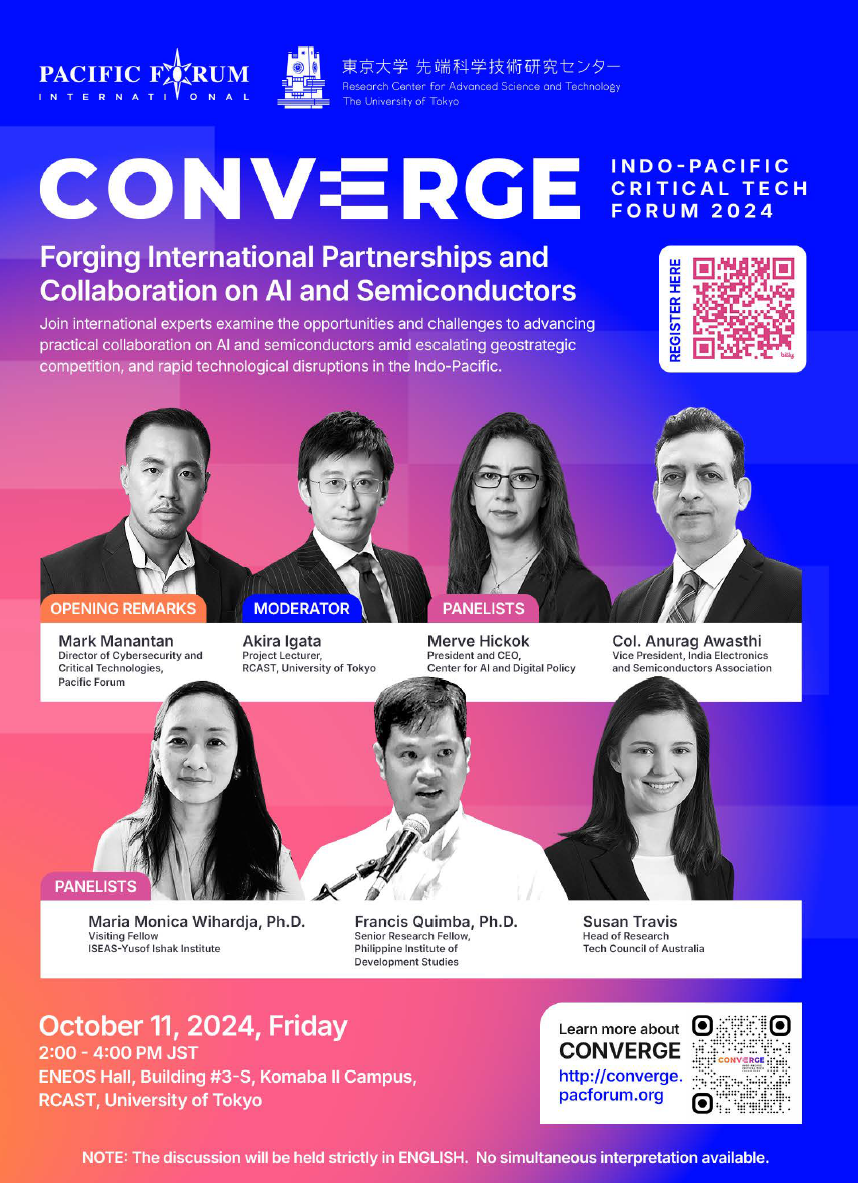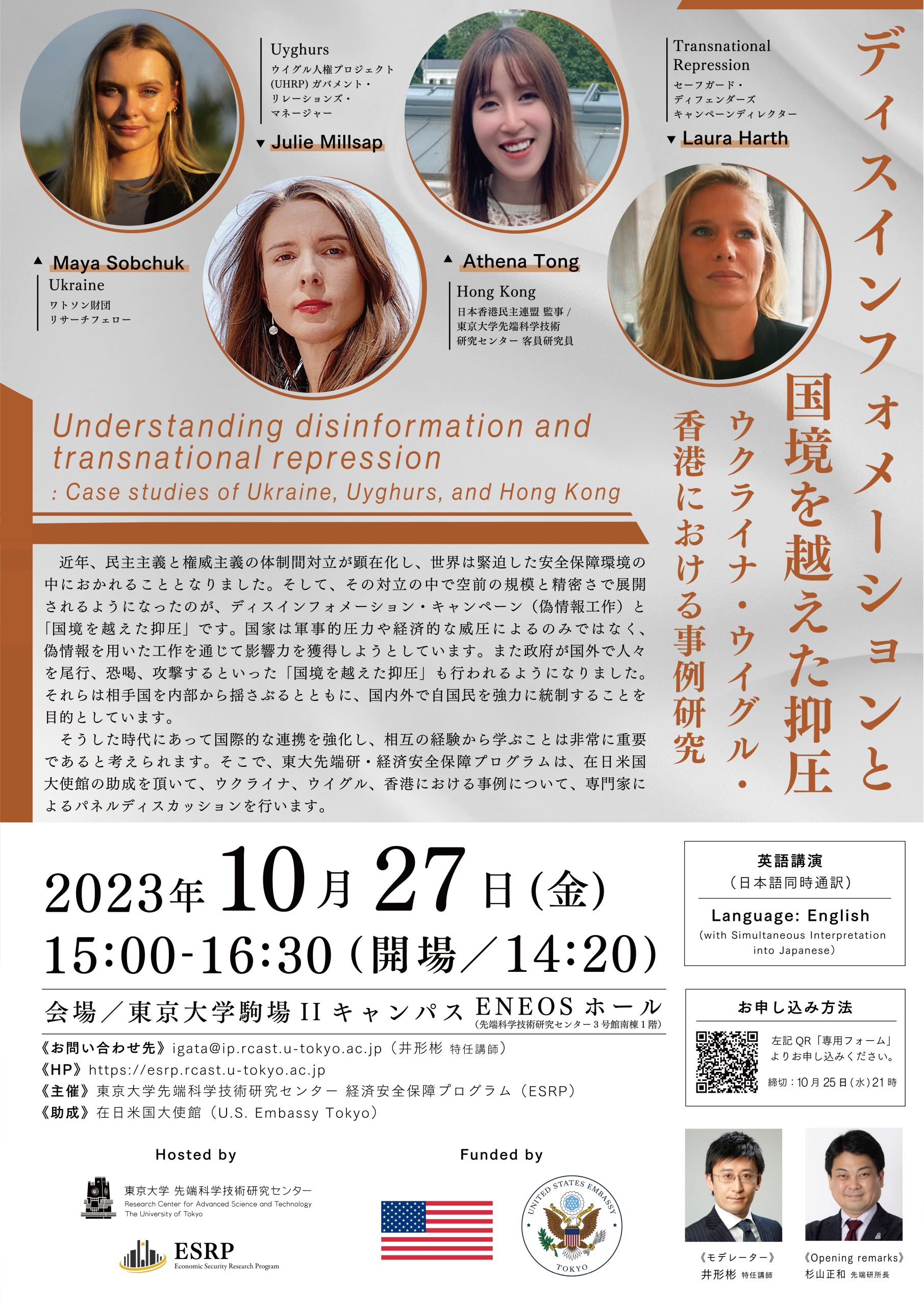Events
Understanding disinformation and transnational repression: Case studies of Ukraine, Uyghurs, and Hong Kong
The Economic Security Research Program (ESRP) at the Research Center for Advanced Science and Technology (RCAST), the University of Tokyo hosted a symposium titled “Understanding Disinformation and Transnational Repression: Case Studies of Ukraine, Uyghurs and Hong Kong” on 27 October 2023.
The symposium featured the Government Relations Manager at The Uyghur Human Rights Project, Julie Millsap; Research Fellow at Watson Foundation Maya Sobchuk; Visiting Researcher at the Research Center for Advanced Science and Technology, University of Tokyo, Athena Tong; and the Campaign Director at Safeguard Defenders, Laura Harth.
After a welcome speech by Masakazu Sugiyama, the Director of RCAST, Adam Gallagher from the U.S. Embassy’s Public Affairs section gave some remarks, highlighting the importance of cooperation between the U.S. and Japan, especially in the face of mutual threats such as that of disinformation.
Following case studies and analysis presented by the speakers, a Q&A session was moderated by Akira Igata, Project Lecturer from the University of Tokyo. Discussions spanned from the role of states and social media platforms in combatting disinformation, to more contextual questions on Russia and China.
Our program stands dedicated to pioneering policy research in economic security, which includes combating foreign information manipulation and interference. Our mission is to fuse the swiftly advancing domains of science and technology with the ever-changing landscape of global politics, vital in shaping a more progressive society.
Overview of the event
| Date | 15:00~16:30 on Oct. 27th (Fri.), 2023 (Doors open at 14:20) |
|---|---|
| Place | Komaba II Campus ENEOS Hall (RCAST 3rd South Building 1st floor) |
| Capacity | 172 |
| Fee | For Free |
| Speakers | 【Panelists】 Maya Sobchuk (Ukraine), a Research Fellow at Watson Foundation Julie Millsap (Uyghurs), the Government Relations Manager at The Uyghur Human Rights Project) Athena Kerin Tong (Hong Kong), a Visiting Researcher at the Research Center for Advanced Science and Technology, University of Tokyo Laura Harth, the Campaign Director at Safeguard Defenders 【Moderator】 Akira Igata, Project Lecturer, RCAST, the University of Tokyo ╰─ HP 【Opening Remark】 Masakazu Sugiyama, Professor and Director of RCAST ╰─ HP |
| Language | The conversation will be held in English with simultaneous interpretation into Japanese |
| Registration | Registration Form |
| Details | This symposium is funded by a grant from the U.S. Embassy Tokyo. All statements made by the moderator and guest speakers and the structure of the symposium are solely those of the guest speakers and ESRP and do not reflect the U.S. government or the U.S. Embassy Tokyo. [RELATED LINKS] YouTube Stream UTokyo Website |

Economic Security Research Program (ESRP) at the Research Center for Advanced Science and Technology (RCAST) at The University of Tokyo, along with the NATO HQ and the Royal Danish Embassy Tokyo (NATO Contact Point Embassy), will co-host the "NATO-Japan Symposium 2024: Partnership in Uncertain Times."
Following the "NATO-Japan Symposium 2023: Emerging Security Challenges," we will once again convene experts from around the world to RCAST, The University of Tokyo to discuss how partner countries can collaborate with each other in the era where uncertainty reigns.
This year, we have the privilege of welcoming the Swedish Defense Minister to make a keynote speech. This will be followed by a discussion among NATO HQ experts, numerous Ambassadors (EU, Norway, Denmark, Romania), and Japan's Parliamentary Vice Minister of Defense, among others.
We will focus on 3 topics during the discussions. (1) Interconnectedness of the Euro-Atlantic and the Indo-Pacific; (2) Navigating uncertain times following the 2024 elections; New government, new threats, new responses; and (3) The Future of NATO-Japan and IP4 Partnership.

The Economic Security Research Program (ESRP) at The Research Center for Advanced Science and Technology (RCAST), The University of Tokyo and The Swedish National China Centre (NKK) and The Asia Programme at The Swedish Institute of International Affairs (UI) will co-host a symposium, with a backing from the Embassy of Sweden in Tokyo, titled “Japan-Sweden Relationship in a shifting era: Exploring common interests and opportunities following the 2024 elections.”
This symposium will bring together Swedish and Japanese experts on security and economic issues to discuss: (1) How Sweden and Japan perceives the impact of various elections that have taken place in 2024 and the increasing coordination between China and Russia; (2) How Sweden and Japan are responding to the rise of China; and (3) Comparative approaches towards de-risking between Europe and Japan

The Economic Security Research Program (ESRP) at RCAST, The University of Tokyo and Pacific Forum will co-host a symposium titled "CONVERGE: Forging International Partnerships and Collaboration on AI and Semiconductors" from 14:00-16:00 on Oct.11.
This symposium will bring together experts from 5 countries in the Indo-Pacific - U.S., Australia, India, Singapore, and the Philippines - to discuss how this region can collaborate better on issues related to AI and semiconductors.
We will share some of the outcomes from the closed discussions, where we examined the challenges and opportunities facing different CET actors operating in the Indo-Pacific related to AI and semiconductors. This will allow for the identification of the means to identify best practices for enhancing Indo-Pacific tech cooperation while building trust between existing stakeholders.
The language of this symposium will be in English. Please note that there is NO simultaneous interpretation. Pre-registration required.

Taiwan has become a global powerhouse in cutting-edge semiconductor manufacturing and a driving force in the next generation of AI revolution. However, due to its dynamic economic relationship and tense military relations with China, the high-tech island nation has found itself at the forefront of potential global conflict zones since the escalation of the techno-geopolitical era of comprehensive US-China competition.
As economic security becomes an increasingly important element of national security, Taiwan’s experience offers important insights into how the People’s Republic of China (PRC) has advanced its technological power. At the event, Dr. Jeremy Chih Cheng Chang, a research fellow and Director of Semiconductor Policy at DEST, a new launched public think tank in Taiwan, will explain the evolution of Taiwan's economic security framework, exploring historical perspectives and regulatory insights, and discussed lessons learned for international allies.
Mailing List
The earliest information about the latest event will be delivered.
Please register from the button below.


